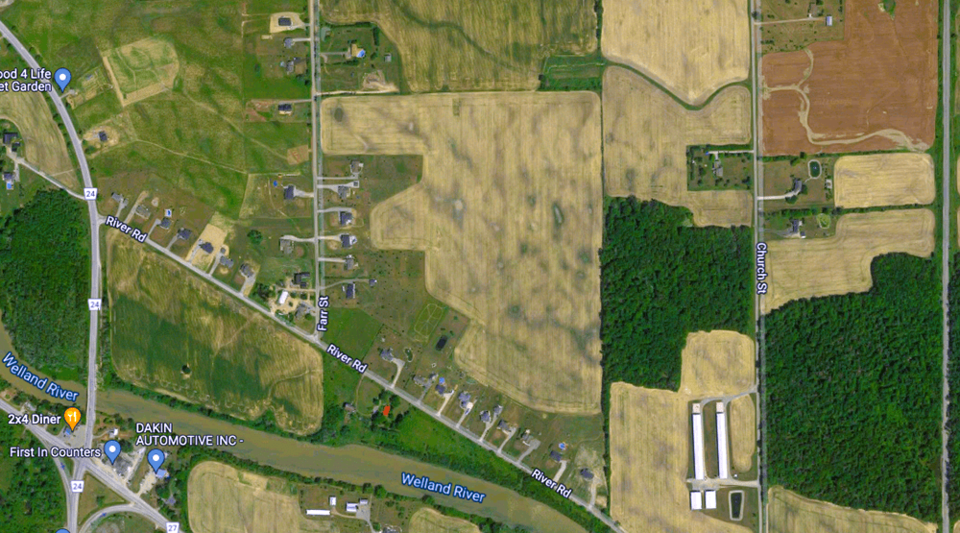The stalled Mariman Estates development, comprised of some three dozen lots off River Road in south Pelham, has an interesting history. Buyers in contact with PelhamToday say that they put down significant deposits several years ago and are disgruntled at the construction delays, but the builder responsible for selling the lots says he wants to make good on his contractual agreements to build the homes.
The saga began in October 2020, when controversial Niagara Falls developer Carlo Montemurro took legal action against the Town of Pelham in reaction to the municipality’s unwillingness to grant building permits for his Wendy Estates development along River Road. The Town argued that it was not a bona fide land development, but rather a “testamentary devise.” Bylaw requirements were not met because the required frontage of all lots on an improved street didn't exist in the development. Montemurro argued that all lots had a 1/37 fractional interest in the Wendy Estate's roadways. He maintained that all the lots are provided with frontage on Farr Road, which is a public road maintained by Pelham.
Montemurro has played the “testamentary devise” card before in Niagara, in the late 1980s and early 1990s. Using what Montemurro himself called a "loophole," according to reporting by the Buffalo News three decades ago, he performed an end-run on the Ontario Planning Act, which prohibits any parceling out of land not considered a registered subdivision. Montemurro won in the Ontario Court of Appeal, despite Associate Chief Justice John Morden saying at the time that Montemurro’s scheme had some "highly distasteful" features.
The testamentary devise loophole was closed in 1990 by the provincial government.
Montemurro’s modus operandi was to sell tracts of land to terminally ill people, generally of low income, as reported by the Buffalo News, and have them bequeath small portions of that land to various people, mostly to beneficiaries designated by Montemurro. Because the law at the time did not ban subdividing land through a will, Montemurro was able to circumvent the normal planning process, which likely would not have approved subdividing agricultural land into residential lots.
In the current case, the homebuilder to whom Montemurro intended to sell the 37 lots was not named in the filed documents, but it appears it was veteran developer Mike Bettiol, of Mariman Homes in Hamilton. Montemurro entered into an agreement for the sale of the development during summer 2019, for a little over $4.2 million dollars.
The Town of Pelham won a victory in the Ontario Superior Court of Justice in Welland in March 2022 over Montemurro and Bettiol, who were listed as plaintiffs in the court action, and whose lawyers asserted that the lot owners have fractional interest in all the other lots in the development, and therefore direct or indirect ownership of the internal roadways of the site. They argued that this meant that all of the lots fronted an improved street because of that interest. The court disagreed, referring to the ploy as “impossible mental gymnastics.”
Fast forward to December 5, when the Home Construction Regulatory Authority (HCRA) announced that the licence of 2363823 ONTARIO INC., Bettiol’s development company, had been suspended. The HCRA said that it had received multiple complaints regarding 2363823 Ontario Inc. and Mariman Homes, and following a lengthy inspection discovered that Bettiol had entered into agreements of purchase and sale for 108 homes (including 37 in Mariman Estates in Pelham, along with two other developments) “without proper authorization.”
In order to minimize harm to the purchasers of the 108 homes, the HCRA suspended Bettiol’s licence “until such time as he demonstrates to the HCRA that he has obtained proper authorization to build and sell these homes in the time period and at the price promised to these consumers.”
Bettiol and his wife, Angela Bettiol, are listed as directors of the corporation, operating under the name Mariman Homes. Between December 2016 and April 2022, Bettiol and Mariman Homes entered into agreements to sell 108 new homes in Ontario in several developments, but were only permitted by HCRA to build or sell seven homes. Further, HCRA charged that most of these new homes have not been enrolled in the warranty program with Tarion, Ontario’s new home warranty program and consumer protection organization.
PelhamToday met with Bettiol to get his perspective on the situation.
“I've been registered for 35 years with Tarion, and have conducted my business the same way the entire time,” said Bettiol. “I find a lot, I list the home to be sold, I find the buyer, I do a contract, I take a deposit which is used to fund the project. But in February of 2021, the rules changed. A new agency called the Home Construction Regulatory Authority, or HCRA, came into effect. The agency had new rules and regulations, including a requirement that I literally call HCRA every time I want to sell an individual potential buyer a house. Before February 2021, I was pre-selling homes. I get a builder bulletin from HCRA with the new rules, but I’ve already pre-sold all my 100 custom homes for the next seven years. Covid delayed a lot of building projects, and when one of my projects got delayed, 10 people registered complaints with HCRA, saying ‘this has been going on too long, we want our deposit back.’ This was in November of 2022.”

Bettiol said that he provided the individual contracts to HCRA, which stated the critical dates for the development to occur. He said that HCRA agreed that the delays were within the acceptable period stated in the contracts. In addition, Tarion created an “unavoidable delay notice”—an additional 30 months of contract leniency for builders due to pandemic setbacks. However, HCRA was concerned that Bettiol had not obtained individual build permissions for his lots. Bettiol argued that most of his lots were sold before HCRA was even created.
“At this point I hired a lawyer, an expert in Tarion matters,” said Bettiol. “HCRA’s lawyer said that they were going to recommend that my licence go under [suspension], because I had hired inadequate lenders [to finance the developments]. I don't know how they came up with that evaluation. So we went before an HCRA tribunal on June 30 of 2023. On the original 10 complaints, we were not charged at all, because nothing specifically contravened the Act. The recommendation of HCRA’s lawyer was that we not get relicensed for the benefit and protection of the consumer. My lawyer responded that we were going to appeal the dismissal. I've got an outstanding record in the industry, and have built 700 homes over my career. None of these 108 people [who have purchased lots] have complained and want their money back. The original 10 complaints got resolved, because I’m still within the allowable delay window.” (The original ten did not get their deposits back.)
Bettiol said that he and his lawyer attended another tribunal in November, where he provided references from previous and current lenders, demonstrating that he could financially continue with his projects.
“My lawyer told the tribunal, ‘If you're successful in taking Mr. Bettiol’s license, those 108 people don't get their homes. Mr. Bettiol will sell the land and retire, return the deposits, and the buyers won’t get the homes they purchased for $1.2 million, that are now valued at $1.6 million.’ So we came up with an agreement that says, from November 30 of 2023 to June 30 of 2024, I have to contact every single buyer and ask them if they still want their home built in the summer of 2024. If they don’t want the home built, and are outside the allowable delay window, I give them their deposit back. Remember that some of my closings extend to 2027.”
Bettiol said that, technically, his license was renewed, based on proof that he had the financial backing to complete the developments. It was suspended the next day. He said that his lenders provided financing for Mariman Estates based on his pre-sales three years ago. If a few buyers want their deposits returned, it shouldn’t be a problem, he said. But if significant numbers opted out, the financing could be jeopardized.
“I intimately know all 108 people [I’ve sold lots to],” said Bettiol. I personally sit in front of every one, and do the contract, the handshake. Of the 108 buyers, I maybe know of 20 that I think are going to want their money back.”
He also said that they timing of the planned completion of the homes is advantageous for his buyers, given the current cost of borrowing.
“Imagine if right now your $1.5 million home was done, and you're putting $800,000 down,” said Bettiol. “Have you seen the interest rates? I think people are going to say, ‘Thank God, Bettiol is going to start construction in the summer, which means my closing is probably a year or two away. By that time, interest rates will have dropped.’ This can work out for everybody. But if you're a consumer protection agency [the HCRA], and you take my license, these people definitely won't get their homes. If you allow me to do what I've done for 35 years, there's a pretty good chance the homes will be built. That's been my stance from day one. I get that the HCRA is a government agency, I understand the optics, and the fact that 10 people complained. It's a shuffle. But that's where we are right now.”
Bettiol estimates that he has had 15 people with lots in the Mariman Estates development reach out to him with questions, especially about his suspended licence.
“We have responded that we are cooperating with HCRA, and are working through the engineering process,” he said.
Pelham’s Director of Community Planning and Development, Barb Wiens, told PelhamToday that, as of December, no build permits have been issued for Mariman Estates.
Bettiol asserts emphatically that he wants to finish the job.
“If the HCRA takes my licence, I’ll put the money in the bank and retire to Naples [Florida],” said Bettiol. “But I don't want to do that. I sold you a home for a million dollars? I’ll build you that home for a million dollars. It can be a win-win. But not if they [HCRA] force my hand, and take my licence. I told them, ‘You say that 10 people were upset? How about the other 108?’ They're going to write angry letters asking why they can't have their home.”



